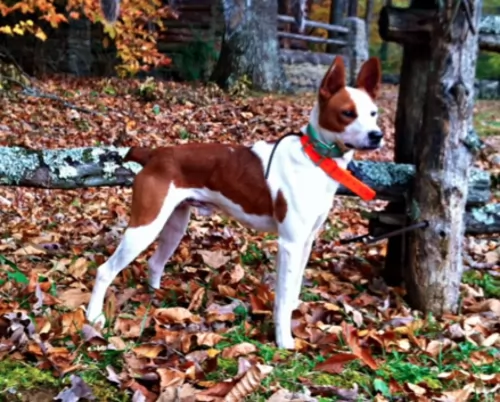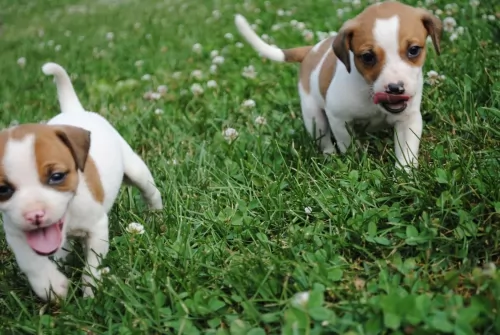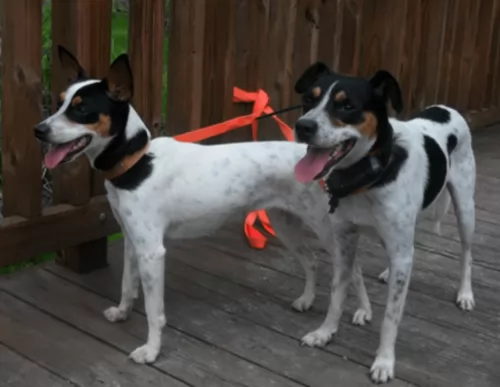 Petzlover
Petzlover Dutch Shepherd is originated from Netherlands but Mountain Feist is originated from United States. Dutch Shepherd may grow 6 cm / 3 inches higher than Mountain Feist. Dutch Shepherd may weigh 22 kg / 48 pounds lesser than Mountain Feist. Dutch Shepherd may live 3 years less than Mountain Feist. Both Dutch Shepherd and Mountain Feist has almost same litter size. Dutch Shepherd requires Moderate Maintenance. But Mountain Feist requires Low Maintenance
Dutch Shepherd is originated from Netherlands but Mountain Feist is originated from United States. Dutch Shepherd may grow 6 cm / 3 inches higher than Mountain Feist. Dutch Shepherd may weigh 22 kg / 48 pounds lesser than Mountain Feist. Dutch Shepherd may live 3 years less than Mountain Feist. Both Dutch Shepherd and Mountain Feist has almost same litter size. Dutch Shepherd requires Moderate Maintenance. But Mountain Feist requires Low Maintenance
 The Dutch Shepherd is of Dutch origin, hailing from the Netherlands. They were originally used as herding dogs on the farms, where they became a jack-of-all-trades type of dog.
The Dutch Shepherd is of Dutch origin, hailing from the Netherlands. They were originally used as herding dogs on the farms, where they became a jack-of-all-trades type of dog.
The Dutch Shepherd in those days, 100 odd years ago, were also known as Hollandse Herders.
These dogs are more rare in modern days, but when you do find them, they are being used as police or security dogs, as guides for the blind, or simply as family friends.
 In the Southern portion of North America, the Mountain Feist was developed. It is the Ozarks and Southern Appalachia that the Mountain Fiest calls his ancestral home. The breed dates back centuries and looks very much like a Jack Russell or rat terrier. George Washington, Abraham Lincoln and William Faulkner all featured the breed in their writings. For Washington it was his diary, Lincoln the poem “The Bear Hunt” and Faulkner “Go Down Moses”. These dogs, much like the Curs, were an important part of the early pioneer days in America.
In the Southern portion of North America, the Mountain Feist was developed. It is the Ozarks and Southern Appalachia that the Mountain Fiest calls his ancestral home. The breed dates back centuries and looks very much like a Jack Russell or rat terrier. George Washington, Abraham Lincoln and William Faulkner all featured the breed in their writings. For Washington it was his diary, Lincoln the poem “The Bear Hunt” and Faulkner “Go Down Moses”. These dogs, much like the Curs, were an important part of the early pioneer days in America.
The name Feist means a noisy, small dog in ancient languages. The Feist was developed in the South, the rural areas, in order to hunt and eliminate vermin and small prey animals. The breed was originally a cross between British terriers and hounds from Native Americans. Many others think the feist is not a breed but a type, a working dog which can vary individual to individual.
The Mountain Feist of today has been bred for hunting performance over generations of time. They hunt racoons, squirrel and rabbits among others. They can track even larger game. Other varieties of the feist include the Bench Legged Feist and the Pencil-tail Feist. This is an energetic working dog, curious, intelligent and alert. It is a loud, barky dog that needs to learn a “no bark” command or it may drive you crazy. The breed make good hunting dogs, watch dogs and companions.
The breed was recognized by the United Kennel Club (UKC) in 2015, but not by the AKC or American Kennel Club. Other breed organizations include the National Cur & Feist Breeder’s Association, The National Feist Breeder’s Association, The American Treeing Feist Association, and the Shadowtails Outdoors Group.
 The Dutch Shepherd dog is very similar in appearance to the popular German Shepherds, being a medium to large sized dog.
The Dutch Shepherd dog is very similar in appearance to the popular German Shepherds, being a medium to large sized dog.
The males are slightly heavier than females, but both males and females can stand between 55 and 62cm and weigh between 20 and 32kg.
There are actually 3 varieties found in the Dutch Shepherd dogs - short-haired, long-haired, and wiry or rough-haired. The dog has a double coat, consisting of a woolly undercoat and a top coat. The basic color of the coat is gold or silver through to red, giving rise to the brindle variations. Too much black or white seen in the fur is considered a fault.
In 1914 it was decided that brindle coats would distinguish them from the others.
The eyes of the Dutch Shepherd are dark, almond shaped and slightly slanting, while the medium sized ears are erect and high on the head and the thick tail is slightly curved. The dog has an unusually long tongue which is often found hanging out.
Early training and socializing for this dog is important so that he can learn to stay calm around new people, or visitors to the property.
The beautiful Dutch Shepherd doesn’t like being left alone for too long, loving rather to be involved with all that the family is involved in. They get on well with other pets in the home as well as being child-friendly.
They are happy dogs, who can also be smart and cunning, therefore highly trainable. They soak up new commands easily. Dutch Shepherds are also good watchdogs as they are fiercely loyal, and do not take kindly to strangers.
 The Mountain Feist is a medium sized dog with pointy ears that are long and fold over. With their sharp nails that are curved they can climb. Their hind legs are strong to support that activity as well. They have small, dark eyes, a black nose and a muzzle that is medium length and a round skull. The neck is strong, and they have a pretty deep chest. The Mountain Feist tail is bushy, high and erect. There coats come in a variety of colors including blue, black, white, red and brown with the brown being the most common.
The Mountain Feist is a medium sized dog with pointy ears that are long and fold over. With their sharp nails that are curved they can climb. Their hind legs are strong to support that activity as well. They have small, dark eyes, a black nose and a muzzle that is medium length and a round skull. The neck is strong, and they have a pretty deep chest. The Mountain Feist tail is bushy, high and erect. There coats come in a variety of colors including blue, black, white, red and brown with the brown being the most common.
There is a lot of variation of make up and type within the breed itself. Until the last decade or so the breed was fairly isolated among squirrel hunters and there was little cross breeding with other dogs. On the other hand, dogs in the regions where the Mountain Feist was isolated were crossed with them to give them the tree climbing ability, change their size, sharpen their senses or one particular sense and change their appearance.
This is why in different regions you will find Mountain Feist with attributes of the Curs, or the Elkhounds, the Terriers, Spitz or Coonhounds. This accounts for the various types of Mountain Feist Dogs.
 Your alert, intelligent and somewhat rare Dutch Shepherd is a loyal, protective dog, and while he can be aggressive around intruders and be a great guard dog, he can also be a gentle, loving animal around his human family members.
Your alert, intelligent and somewhat rare Dutch Shepherd is a loyal, protective dog, and while he can be aggressive around intruders and be a great guard dog, he can also be a gentle, loving animal around his human family members.
Though his tongue is long and often hangs out, you won’t have to contend with drooling. He is a wonderfully active dog and doesn’t easily gain weight. He isn’t a barker or howler, and his exceptional intelligence makes him highly trainable.
Whether there are children or other animals in the house, you can rely on your Dutch Shepherd to get on well with them, making him a wonderful family pet and canine friend.
 Yes, they very much enjoy playing with children.
Yes, they very much enjoy playing with children.
Tree climbing and stamina.
They need space and land on which to run every day. If you are in an apartment, make sure you have access to a dog park.
They are very intelligent and learn quickly. They love to please but can also be stubborn.
 The Dutch Shepherd dogs are the healthiest of the Shepherd breeds. They have relatively few health problems.
The Dutch Shepherd dogs are the healthiest of the Shepherd breeds. They have relatively few health problems.
However, like the German Shepherds they may develop hip dysplasia, but this is in fact fairly rare. Get your pet to the vet if you suspect this in your dog because it can lead to lameness.
In 2018 the University of Minnesota identified a disease in Dutch Shepherds called Miositis. This is an inflammatory myopathy causing painful inflammation of the skeletal muscle tissue.
 Like most breeds that are isolated, the Mountain Feist does not have a lot of known genetic health issues. They are generally healthy and known to live as many as eighteen years. Perhaps the biggest threat to their lives is the hunting accident, harming joints or paws in hunting situations or being attacked by a larger animal. There are no real genetic threat. Of course, with any dog that has folded ears there is always the possibility of infection or allergies. Keep their ears clean. The other possible concern is hip dysplasia in such an active dog. This can lead to lameness or arthritis. Obesity is another concern that could also lead to hip dysplasia.
Like most breeds that are isolated, the Mountain Feist does not have a lot of known genetic health issues. They are generally healthy and known to live as many as eighteen years. Perhaps the biggest threat to their lives is the hunting accident, harming joints or paws in hunting situations or being attacked by a larger animal. There are no real genetic threat. Of course, with any dog that has folded ears there is always the possibility of infection or allergies. Keep their ears clean. The other possible concern is hip dysplasia in such an active dog. This can lead to lameness or arthritis. Obesity is another concern that could also lead to hip dysplasia.
 Unfortunately Dutch Shepherds shed quite a bit of hair during their shedding period in spring and autumn. This makes regular brushing important during these seasons so as to remove the dead hairs, especially from the undercoat.
Unfortunately Dutch Shepherds shed quite a bit of hair during their shedding period in spring and autumn. This makes regular brushing important during these seasons so as to remove the dead hairs, especially from the undercoat.
The wire- or rough-haired variety shouldn’t be brushed but should rather be groomed by a professional groomer every 6 months or so.
Their nails need to be trimmed when necessary, to avoid cracking, splitting, or an injury.
Their ears can be cleaned weekly to get rid of any debris or wax build-up. This, if left, can lead to infection. Brush his teeth 2 or 3 times a week to avoid dental disease which brings on a host of illnesses.
These dogs do need regular exercising, and at the same time need to be physically and mentally stimulated. He is the kind of dog that has been used for herding purpose on the farm and he just craves activity. Take him with you on your walks and include him in ball games, hikes, jogging, swimming or when you go cycling – he is game for all kinds of activities.
The formula for their diet would be that of a medium to large dog with high energy levels. The top commercially manufactured foods have been developed to include all the important vitamins and minerals. Fish oil can also be added to their food to keep the coat shiny.
Add in cooked rice, cooked vegetables and chicken from time to time and be sure to add in some raw meat occasionally to prevent problems with the skin. Always ensure that your pet has fresh, cool water to drink.
 These are very active pups who need a high protein, high quality dry food. Feed a cup to a cup and half broken down into three meals daily. Do not overfeed your puppy.
These are very active pups who need a high protein, high quality dry food. Feed a cup to a cup and half broken down into three meals daily. Do not overfeed your puppy.
Feed the adult about two cups a day broken into two meals. Again, you are looking for a high quality, high protein dry food. Do not overfeed and watch for obesity.
This is a very active breed – a hunting dog with a lot of stamina, strength and energy. They need plenty of exercise as the terrier side of them is just a little hyper. They need at least two walks per day, and they are not great apartment dogs. They need both mental and physical stimulation. This little dog can keep going at a good rate for a long time.